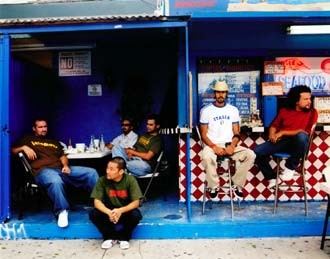|
Ozomatli wrestles with the conflicting demands of activism and corporate sponsorship Fresh, energetic, and wholly unique, Ozomatli's sound is beyond comparison: a multi-genre melange of musical estilos that comes from a place of authenticity, not appropriation. Hip-hop, salsa, funk, rock, and a dozen other influences all cross-pollinate with some of the most conscious lyrics, in English and Spanish, to come out of any band worth listening - and dancing - to. Nothing captures their essence, however, more than their live shows. By the conclusion of a performance, they burst off stage, taking a leap of faith into the audience to play, dance and - once they set down their instruments - talk and mingle with their fans. As a band they have more than kept up their end of an unspoken contract which asks, in essence, that they remain true to their principles and they will be rewarded with a devotion and following unlike any other group, as diverse and varied in composition as the band's musical influences. Some of Ozo's founding members, like bassist Will "Wil-Dog" Abers, a red-diaper baby, were activists-in-training whose commitment to various causes - Zapatista solidarity, Free Mumia, the anti-war movement - still comes through in their music, while other members just wanted to make music and have fun doing it. "Not all songs are political," Abers says in a phone interview with the Current. "Some are about having fun, about love - but as a band, that's what we represent." How else to explain a party anthem like "Saturday Night," which calls for revolution over a heavy brass/funk beat, or the paz y amor lullaby "Cuando Canto" (both off Street Signs, their latest album) where they hope that their music will inspire others to make change? As part of their creative process, Abers explains, the group asked themselves: "With all the things going on in the world, is it even possible to create a different world?" It may be, but Ozo faces a constant challenge to translate what they are doing into a viable scene which supports their endeavors. "We're not a part of something. If you like rock en español you won't necessarily like us. If you like hip-hop that doesn't mean you're going to like us," Abers says. "We're doing something that's completely different and new." With Street Signs, Ozo is attempting to reach Mexican and Central American communities in a way they have, thus far, been unable to accomplish. It's one of the great ironies of this LA-based outfit's career that their songs are predominantly sung in Spanish, but English-speaking Latinos and Anglos dominate their audience. The band hopes their summer tour, with hyperkinetic rockeros Kinky and the irreverent DJ duo Plastilina Mosh - both from Monterrey, Mexico - will help them reach the Latin-American fans they covet. The tour, through the national House of Blues franchise, is being sponsored by Coors - a move that has several longtime fans, well aware of the beer company's right-leaning politics, scratching their heads. "We're scratching our heads as well," Abers quips. The tour wouldn't have happened without corporate sponsorship, he says, quickly pointing out that every act on a major label has made compromises of one kind or another. In a recent internet message, Ozo addressed fans' concerns about the Coors association, stating "We made it very clear from day one we would not endorse any commercial products. We've therefore gone out of the way to make this an arms-length arrangement, and the band does not have a direct financial benefit from the deal."
The Denver, Colorado-based, family-owned brewery, whose brands include Coors, Zima, Killians, and Keystone, was the target of boycotts by Chicano groups during the '60s and '70s, and lesbian and gay organizations over the last two decades. In recent years the company has pacified critics by changing policies (they were the first brewery to offer same-sex benefits, in 1995) and donating money to organizations in those communities - including the Gay and Lesbian Alliance Against Defamation, and the San Antonio-based Hispanic Association of Colleges and Universities. The bulk of their philanthropic donations, however, continue to fund right-wing initiatives. Coors money helped found groups including the Heritage Foundation, a highly influential conservative think tank; Coors' family-run nonprofit Castle Rock Foundation, although no longer directly funded by beer sales, gave the Heritage Foundation $200,000 for the fiscal year 2002, according to tax returns. In addition to donations of $32,000 and $40,000 to the American Indian College Fund and the United Negro College Fund, respectively, the foundation also gave $50,000 to the Center for Individual Rights, a legal firm which most recently backed the challenges to affirmative action at the University of Michigan, and $138,850 to Hillsdale College, a rural Michigan school which refuses all federal funding in order to escape anti-discrimination regulations. Abers admits the Coors sponsorship was a difficult decision for the band to make, but believes that it will prove beneficial in the long run. "Doing this doesn't undermine anything we've done for the movement," he says, before adding, "I hope it's worth it." For Ozomatli's fans, and the communities they represent, he better be right. l
|


